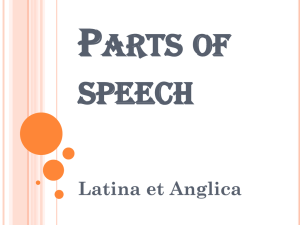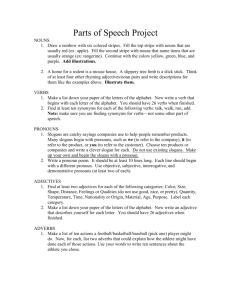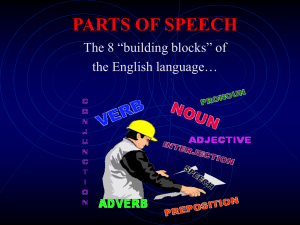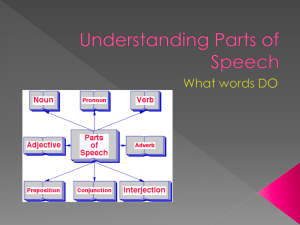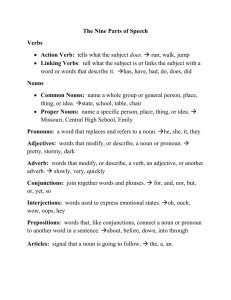GRAMMAR REVIEW PARTS OF SPEECH AND PARTS OF THE SENTENCE
advertisement
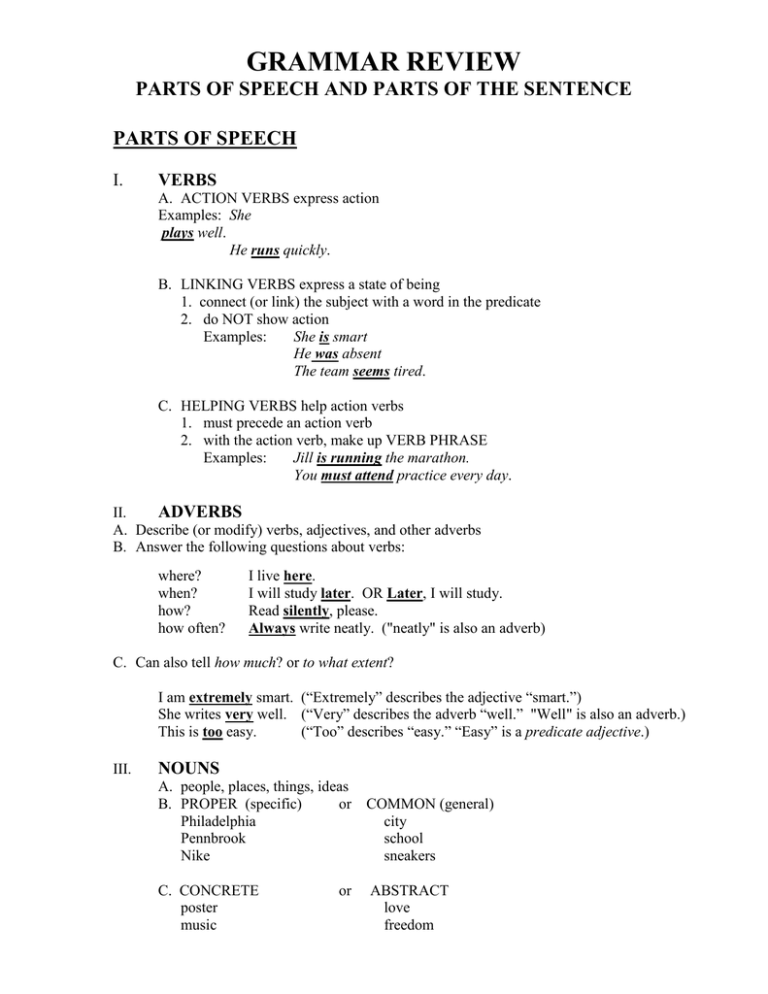
GRAMMAR REVIEW PARTS OF SPEECH AND PARTS OF THE SENTENCE PARTS OF SPEECH I. VERBS A. ACTION VERBS express action Examples: She plays well. He runs quickly. B. LINKING VERBS express a state of being 1. connect (or link) the subject with a word in the predicate 2. do NOT show action Examples: She is smart He was absent The team seems tired. C. HELPING VERBS help action verbs 1. must precede an action verb 2. with the action verb, make up VERB PHRASE Examples: Jill is running the marathon. You must attend practice every day. II. ADVERBS A. Describe (or modify) verbs, adjectives, and other adverbs B. Answer the following questions about verbs: where? when? how? how often? I live here. I will study later. OR Later, I will study. Read silently, please. Always write neatly. ("neatly" is also an adverb) C. Can also tell how much? or to what extent? I am extremely smart. (“Extremely” describes the adjective “smart.”) She writes very well. (“Very” describes the adverb “well.” "Well" is also an adverb.) This is too easy. (“Too” describes “easy.” “Easy” is a predicate adjective.) III. NOUNS A. people, places, things, ideas B. PROPER (specific) or Philadelphia Pennbrook Nike COMMON (general) city school sneakers C. CONCRETE poster music ABSTRACT love freedom or heat beauty Relative pronouns—introduce dependent (noun) clauses C. who which whom that IV. PRONOUNS A. take the place of nouns B. replace an ANTECEDENT (ant.) Gina did her homework. ant. pronoun. Has Jeff done his? ant. pronoun. what whoever whose whatever He is the man who helped with the part. Here is the book that you loaned me. D. Interrogative pronouns—same as above, but they introduce a question. Who sent the letter? What book is that? V. ADJECTIVES A. B. C. D. describe (or modify) nouns and pronouns tell What kind of? Which one? How many? How much? Nouns are sometimes used as adjectives DEMONSTRATIVE ADJECTIVES: this, that, these, those can be adjectives or pronouns EXAMPLES: The bright girl got an "A." Marty is bright, too. That girl is smart. Three girls got "A's." We bought an American car This class is great. This dog is mine. adj. IV. This is my dog. pronoun PREPOSITIONS A. B. C. D. relate a noun or pronoun to another part of the sentence begin a PREPOSITIONAL PHRASE must be followed by a phrase cannot be followed by a verb or another preposition I may be going (to Puerto Rico). I like to run around (in the park). Verb V. adverb prep. Object of preposition CONJUNCTIONS A. conect words B. and, but, or are most common: I do my homework, and I get mostly A's or B's. C. subordinate conjunctions introduce subordinate (dependent) clauses after although as VI. so since unless as if before if until while where INTERJECTIONS A. show strong emotion B. followed by an exclamation point, or comma when the feeling is not as strong. Hey! That hurt. Hey, do you have a pencil I can borrow?
